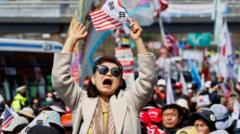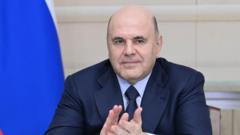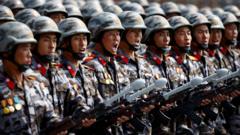The situation leads to urgent questions about the future of South Korea's leadership and political dynamics.
South Korea's Yoon Suk Yeol Ousted: What Lies Ahead?

South Korea's Yoon Suk Yeol Ousted: What Lies Ahead?
After a unanimous ruling by the Constitutional Court, South Korea's President Yoon Suk Yeol has been removed from office.
South Korea is facing a critical juncture as President Yoon Suk Yeol has been removed from power following a unanimous ruling by the Constitutional Court to uphold his impeachment. This decision, reached on Friday, marks a significant shift in the country's political landscape, as Yoon, who was suspended in December after his controversial imposition of martial law, must now vacate his office.
The court's ruling was met with a mix of celebration and sorrow among supporters and detractors of Yoon, who gathered across Seoul to witness the decision's announcement live. As South Koreans seek a path forward after months of political upheaval, a snap election to elect Yoon's successor is mandated by law to occur by June 3.
While many view the decision as a restoration of democratic values, the repercussions of Yoon's actions have created enduring divides within society. His brief military order to storm parliament in December awakened fears reminiscent of South Korea's dictatorial past, leading the public to question their political rights and the very fabric of democracy in the nation. The judge leading the court's decision condemned Yoon's actions as a serious infringement on political rights and legality.
Calls for constitutional reform are gaining momentum as citizens express concerns about similar authoritarian tendencies in future leaders. However, achieving this reform may be problematic given the inherent self-interest of politicians in preserving their powers.
The political climate in South Korea remains polarized, reflecting deep divisions among its citizens. Many have turned to Yoon’s narrative of conspiracy, wherein he argues that foreign "anti-state forces" have infiltrated the country. His claims resonate with a substantial segment of the populace, complicating the political environment and fostering unease regarding the integrity of elections and judicial institutions.
As the nation gears up for election season, it grapples with significant issues. Skyrocketing tension awaits, as allegations of corruption and a costly relationship with the United States loom over the horizon. President Trump’s tariffs on South Korean goods have already challenged the economy, just as discussions regarding military support raise questions about how to navigate foreign relations during this tumultuous period.
Yoon's legal team has responded critically to the court's judgment, labeling it a politically motivated decision. While his political party has acknowledged the ruling, Yoon himself remains defiant, expressing regrets to his followers without recognizing the court's authority.
Once celebrated as a transformative leader, Yoon's tenure now stands as a cautionary tale. With South Korea set to elect new leadership, the nation stands on the cusp of potential reform but also faces the risk of exacerbated political divides as it moves forward into uncharted territory.
The court's ruling was met with a mix of celebration and sorrow among supporters and detractors of Yoon, who gathered across Seoul to witness the decision's announcement live. As South Koreans seek a path forward after months of political upheaval, a snap election to elect Yoon's successor is mandated by law to occur by June 3.
While many view the decision as a restoration of democratic values, the repercussions of Yoon's actions have created enduring divides within society. His brief military order to storm parliament in December awakened fears reminiscent of South Korea's dictatorial past, leading the public to question their political rights and the very fabric of democracy in the nation. The judge leading the court's decision condemned Yoon's actions as a serious infringement on political rights and legality.
Calls for constitutional reform are gaining momentum as citizens express concerns about similar authoritarian tendencies in future leaders. However, achieving this reform may be problematic given the inherent self-interest of politicians in preserving their powers.
The political climate in South Korea remains polarized, reflecting deep divisions among its citizens. Many have turned to Yoon’s narrative of conspiracy, wherein he argues that foreign "anti-state forces" have infiltrated the country. His claims resonate with a substantial segment of the populace, complicating the political environment and fostering unease regarding the integrity of elections and judicial institutions.
As the nation gears up for election season, it grapples with significant issues. Skyrocketing tension awaits, as allegations of corruption and a costly relationship with the United States loom over the horizon. President Trump’s tariffs on South Korean goods have already challenged the economy, just as discussions regarding military support raise questions about how to navigate foreign relations during this tumultuous period.
Yoon's legal team has responded critically to the court's judgment, labeling it a politically motivated decision. While his political party has acknowledged the ruling, Yoon himself remains defiant, expressing regrets to his followers without recognizing the court's authority.
Once celebrated as a transformative leader, Yoon's tenure now stands as a cautionary tale. With South Korea set to elect new leadership, the nation stands on the cusp of potential reform but also faces the risk of exacerbated political divides as it moves forward into uncharted territory.



















